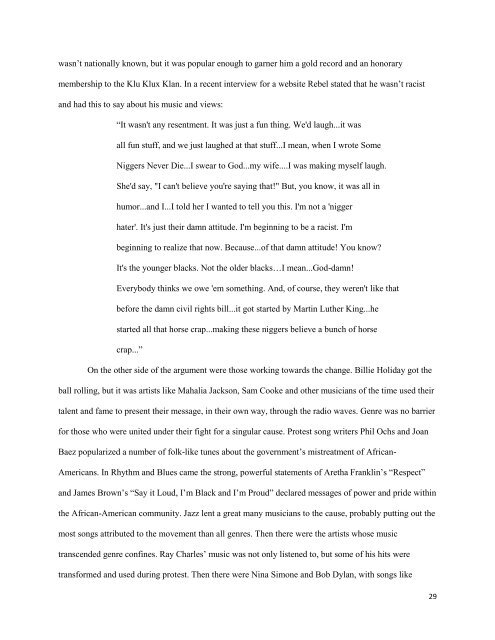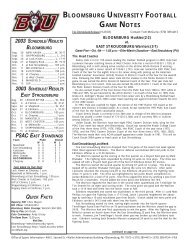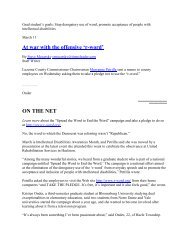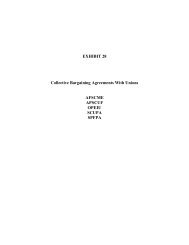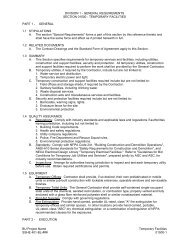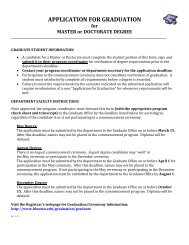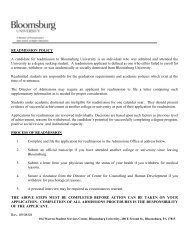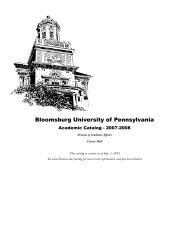Human Rights at Home and Abroad: Past, Present, and Future
Human Rights at Home and Abroad: Past, Present, and Future
Human Rights at Home and Abroad: Past, Present, and Future
Create successful ePaper yourself
Turn your PDF publications into a flip-book with our unique Google optimized e-Paper software.
wasn‘t n<strong>at</strong>ionally known, but it was popular enough to garner him a gold record <strong>and</strong> an honorary<br />
membership to the Klu Klux Klan. In a recent interview for a website Rebel st<strong>at</strong>ed th<strong>at</strong> he wasn‘t racist<br />
<strong>and</strong> had this to say about his music <strong>and</strong> views:<br />
―It wasn't any resentment. It was just a fun thing. We'd laugh...it was<br />
all fun stuff, <strong>and</strong> we just laughed <strong>at</strong> th<strong>at</strong> stuff...I mean, when I wrote Some<br />
Niggers Never Die...I swear to God...my wife....I was making myself laugh.<br />
She'd say, "I can't believe you're saying th<strong>at</strong>!" But, you know, it was all in<br />
humor...<strong>and</strong> I...I told her I wanted to tell you this. I'm not a 'nigger<br />
h<strong>at</strong>er'. It's just their damn <strong>at</strong>titude. I'm beginning to be a racist. I'm<br />
beginning to realize th<strong>at</strong> now. Because...of th<strong>at</strong> damn <strong>at</strong>titude! You know?<br />
It's the younger blacks. Not the older blacks…I mean...God-damn!<br />
Everybody thinks we owe 'em something. And, of course, they weren't like th<strong>at</strong><br />
before the damn civil rights bill...it got started by Martin Luther King...he<br />
started all th<strong>at</strong> horse crap...making these niggers believe a bunch of horse<br />
crap...‖<br />
On the other side of the argument were those working towards the change. Billie Holiday got the<br />
ball rolling, but it was artists like Mahalia Jackson, Sam Cooke <strong>and</strong> other musicians of the time used their<br />
talent <strong>and</strong> fame to present their message, in their own way, through the radio waves. Genre was no barrier<br />
for those who were united under their fight for a singular cause. Protest song writers Phil Ochs <strong>and</strong> Joan<br />
Baez popularized a number of folk-like tunes about the government‘s mistre<strong>at</strong>ment of African-<br />
Americans. In Rhythm <strong>and</strong> Blues came the strong, powerful st<strong>at</strong>ements of Aretha Franklin‘s ―Respect‖<br />
<strong>and</strong> James Brown‘s ―Say it Loud, I‘m Black <strong>and</strong> I‘m Proud‖ declared messages of power <strong>and</strong> pride within<br />
the African-American community. Jazz lent a gre<strong>at</strong> many musicians to the cause, probably putting out the<br />
most songs <strong>at</strong>tributed to the movement than all genres. Then there were the artists whose music<br />
transcended genre confines. Ray Charles‘ music was not only listened to, but some of his hits were<br />
transformed <strong>and</strong> used during protest. Then there were Nina Simone <strong>and</strong> Bob Dylan, with songs like<br />
29


